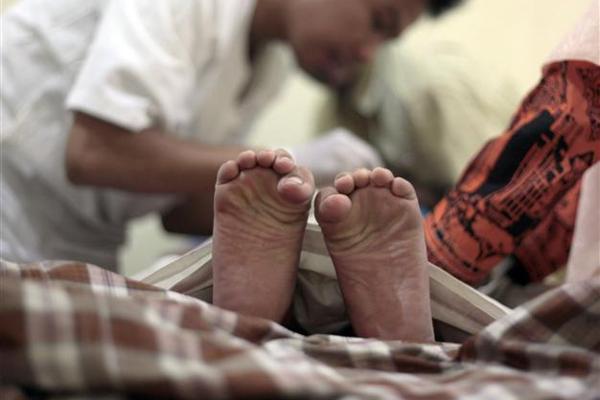German court’s move to ban circumcision unites religions
ISTANBUL - Anatolia News Agency


A boy's toes curl in pain as a doctor performs circumcision on him during a charge-free mass circumcision sponsored by a gubernatorial candidate in Jakarta, Indonesia, Tuesday, June 26, 2012. AP Photo
A German court’s ban on circumcising baby boys has provoked a rare show of unity between Muslims, Jews and Christians, who see it as a threat to religious freedom, while doctors are warning that the ban could increase health risks by forcing the practice underground.European rabbis meeting in Berlin on July 12 promised to defy the ruling by a court in the city of Cologne last month. They plan further talks with Muslim and Christian leaders in Stuttgart next week to see how they can fight the ban together. “We urge the Jewish community in Germany and circumcisers to continue to perform circumcisions and not to wait for a change in the law,” said Pinchas Goldschmidt, Swiss-born chief rabbi of Moscow. Goldschmidt said the ban posed a threat to the existence of the Jewish community in Germany and is a new example of creeping prejudice in European law against non-Christians, after a Swiss ban on minarets, French and Belgian bans on Islamic veils in public, and an attempted Dutch ban on halal meat.
The Cologne court took action after police were alerted by a doctor who treated a Muslim boy for bleeding after he underwent circumcision. It emphasized that it did not ban circumcision, but wanted families to wait until their sons were older. So far the ban applies only to the area of the Cologne court’s jurisdiction.
Support from EU lawmakers
Germany is home to about 4 million Muslims and 120,000 Jews. Many of the former are originally from Turkey, which also condemned last month’s court ruling. Ali Dere, Turkey’s departmental manager for external relations of the Directorate for Religious Affairs (Diyanet) in Germany, said this step was the beginning of a new wave of discrimination against Muslims in Germany. Muslim and Jewish groups have also issued a joint call for German lawmakers to protect the right to circumcise boys. Several Islamic and Jewish organizations said in a statement released July 11 that they had met with legal and medical experts and European Parliament deputies in Brussels this week to discuss the court’s decision. “We consider this to be an affront [to] our basic religious and human rights,” the joint appeal said, Agence France-Presse reported.
The joint statement was signed by leaders of groups including Germany’s Turkish-Islamic Union for Religious Affairs, the Islamic Center Brussels, the Rabbinical Centre of Europe, the European Jewish Parliament and the European Jewish Association. They met with members of European Parliament from Germany, Finland, Belgium, Italy and Poland, according to the statement released by the Turkish-Islamic Union.
The head of the German Medical Association, Frank Ulrich Montgomery, said the ban meant there was “an increased risk of this task being performed by lay people which, because of poor hygiene conditions, could lead to serious complications.” But Montgomery said he sadly had to advise his colleagues to refrain from performing the operation until the legal situation had been clarified, otherwise they could face prosecution, Reuters reported. In response to concerns, the German government pledges quick action on July 13 to protect the right of Jews and Muslims to circumcise baby boys on religious grounds. Chancellor Angela Merkel’s spokesman Steffen Seibert told reporters it was “concerned” about the judgment published by a Cologne regional court. “It is absolutely clear to the federal government that we want Jewish, we want Muslim religious life in Germany. Circumcisions carried out in a responsible way must not be subject to prosecution in this country,” he said.
“It is urgently necessary that we establish legal certainty.” He said that aides from Merkel’s office would now discuss with the relevant government ministries ways to put the rite on firm legal footing. “It is clear this cannot be put on the back burner. Freedom to practice religion is a cherished legal principle,” he said.
A spokeswoman for the justice ministry said that there were three options for new draft laws to protect circumcisions on religious grounds that were under “intensive” review.
